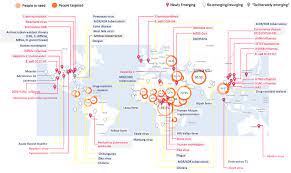Social media is often blamed for the mental health struggles of young adults, but new research from the University of British Columbia (UBC) suggests that the key to reducing social media stress lies not in quitting the platforms, but in using them more mindfully. According to a recent study led by psychology professor Dr. Amori Mikami, how young people engage with social media may be more important than how much time they spend on it.
Published this week in the Journal of Experimental Psychology: General, the study explored the mental health effects of quitting social media versus using it more intentionally. Dr. Mikami and her team found that both abstaining from social media and engaging in more thoughtful usage led to improvements in mental health, including reductions in anxiety, depression, and loneliness.
“As social media use has become nearly universal among young adults, especially those between 17 and 29, there has been growing concern about its impact on mental health,” Dr. Mikami explained. “There’s a lot of talk about how damaging social media can be, but our team wanted to explore whether how people engage with social media might make a difference.”
To investigate this, Dr. Mikami and her colleagues conducted a six-week study with 393 Canadian young adults who had expressed concerns about social media’s impact on their well-being. Participants, all of whom had some mental health symptoms, were divided into three groups: a control group, an abstinence group that was asked to stop using social media entirely, and a tutorial group that was coached on intentional social media use.
The tutorial group received guidance on how to foster meaningful online connections, avoid self-comparison, and selectively curate their social media feeds. By limiting interactions that could trigger envy or negative self-esteem, participants in this group built a healthier online environment. Instead of passively scrolling through their feeds, they were encouraged to engage with friends by commenting on posts or sending direct messages—actions that tend to promote deeper social connections.
Both the abstinence and tutorial groups reduced their social media usage and reported fewer social comparisons, a common cause of anxiety and low self-esteem. However, while the abstinence group saw significant improvements in reducing symptoms of depression and anxiety, they reported no improvement in loneliness. In contrast, the tutorial group did not reduce their social media use as much, but they experienced notable reductions in loneliness and fear of missing out (FOMO).
“Cutting off social media might reduce the pressures that come with presenting a curated image online,” said Dr. Mikami. “But quitting entirely also removes the social connections that many young adults rely on to stay in touch with friends and family, which can lead to feelings of isolation.”
The study highlights the importance of “smarter” social media engagement. Dr. Mikami and her graduate students, Adri Khalis and Vasileia Karasavva, emphasized the idea that quality interactions matter more than quantity. By muting or unfollowing accounts that triggered negative feelings and prioritizing interactions with close friends, tutorial participants created a more supportive and positive online experience.
“For many young adults, quitting social media isn’t a realistic option,” Dr. Mikami said. “Social media is here to stay, but with the right strategies, young people can use it in a way that supports their mental health rather than detracting from it.”
The study’s findings offer a valuable perspective for mental health programs and educational institutions. Dr. Mikami envisions workshops and sessions where young adults can learn how to use social media as a tool to strengthen relationships and avoid the negative cycles of quitting and returning to platforms. This approach could help break the pattern of logging off to escape social media stress, only to return later with even greater negative impacts.
In conclusion, the research shows that young people’s well-being is closely tied to how they engage with social media. As Dr. Mikami put it, “For many young people, it’s not about logging off. It’s about leaning in – in the right way.” This balanced approach could offer a way forward for those seeking to protect their mental health while still enjoying the social connections that these platforms provide.











